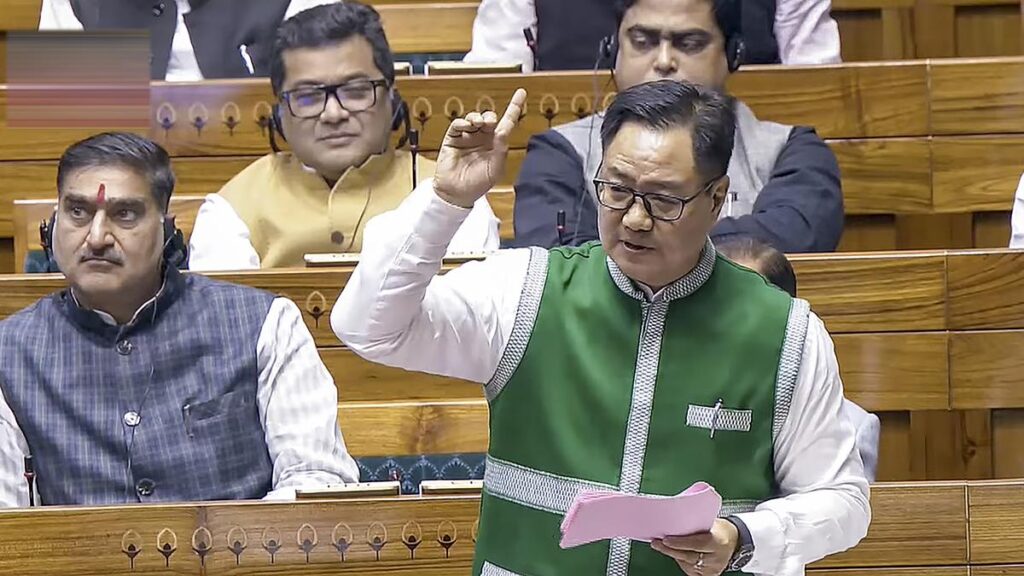Constitutional Amendment Bill Aims to Roll Out Simultaneous Elections
The Union Cabinet, chaired by Prime Minister Narendra Modi, has approved the introduction of two pivotal bills in the Lok Sabha on December 16, 2024, as part of the government’s ambitious push for the “One Nation, One Election” initiative. This significant legislative step seeks to synchronize the schedules of Lok Sabha and state assembly elections, aiming to enhance efficiency and reduce electoral expenditure.
Key Legislation Scheduled for Introduction
Union Law Minister Arjun Ram Meghwal will present The Constitution (129th Amendment) Bill and The Union Territories Laws (Amendment) Bill in the Lower House during the ongoing Winter Session of Parliament. These bills represent a critical move toward implementing simultaneous elections, a long-standing commitment of the ruling BJP.
The Constitution (129th Amendment) Bill proposes changes to the Constitution to enable the concurrent conduct of Lok Sabha and state legislative assembly elections. Meanwhile, The Union Territories Laws (Amendment) Bill aims to align the electoral schedules of Union Territories with legislative assemblies in accordance with the proposed constitutional changes.
The Vision of “One Nation, One Election”
The “One Nation, One Election” concept is a bold attempt to streamline India’s electoral process by synchronizing Lok Sabha and state assembly elections. Advocates argue that this approach will minimize disruptions caused by frequent elections, reduce administrative costs, and ensure consistent governance.
This move follows the recommendations of a high-level committee chaired by former President Ram Nath Kovind. The committee had previously suggested conducting elections for municipalities and panchayats along with national and state elections in a phased manner. However, the Cabinet has decided not to include local body elections in the current framework.
Cabinet Approval and Legislative Intent
On December 12, the Union Cabinet approved the constitutional amendment bill, marking a significant milestone in the journey toward simultaneous elections. In addition to the constitutional amendment, a simple bill addressing provisions in laws governing three Union Territories with legislative assemblies has also been cleared. This will ensure alignment with the larger constitutional framework being proposed.
Simultaneous Polls: A Game-Changing Reform or a Controversial Move?
The push for “One Nation, One Election” has sparked intense debate across political and social spheres. Proponents view it as a transformative reform capable of unifying the electoral cycle, streamlining the administrative burden, and fostering better governance. It could eliminate the “election mode” disruptions that frequently impede legislative work and developmental activities.
However, critics have raised concerns about its practicality, constitutional validity, and potential challenges to federalism. The logistical complexities of conducting synchronized elections across India’s vast and diverse landscape remain a contentious issue. Additionally, opposition parties argue that the move may centralize power and undermine the autonomy of state governments.
Historical and Legislative Context
Simultaneous elections were the norm in India during the initial decades post-independence, but the practice was disrupted in 1967 due to premature dissolution of some state assemblies and later the Lok Sabha. Since then, staggered elections have become the standard, with each state having its own electoral schedule.
The proposed reform seeks to bring back the concept of synchronized elections, which would necessitate significant constitutional amendments and an overhaul of existing electoral mechanisms. The Constitution (129th Amendment) Bill is expected to address these legal and procedural challenges.
Opposition Reactions and the Road Ahead
The introduction of the “One Nation, One Election” bills is expected to reignite political debates during the Winter Session of Parliament. Opposition parties have already expressed reservations, citing concerns about undermining the federal structure and questioning the prioritization of this reform over pressing economic and social issues.
While the government remains steadfast in its commitment to this reform, achieving consensus among political stakeholders will be crucial. The passage of a constitutional amendment requires a two-thirds majority in both Houses of Parliament and ratification by at least half of the state legislatures.
Broader Implications
If implemented, the “One Nation, One Election” initiative could have far-reaching implications for India’s democratic framework. It would necessitate logistical synchronization of voting across states and union territories, coordination of election security, and a robust mechanism to address potential challenges.
Although the current bills focus on aligning Lok Sabha and state assembly elections, the possibility of including municipal and panchayat polls in future phases indicates the government’s long-term vision for comprehensive electoral reform.
The introduction of the “One Nation, One Election” bills represents a pivotal moment in India’s democratic journey. As the legislative process unfolds, the nation will witness heated debates and discussions on the practicality, advantages, and challenges of this ambitious electoral reform. Whether this initiative will redefine the electoral landscape or face significant roadblocks remains to be seen. For now, all eyes are on the Lok Sabha session scheduled for December 16, where the first legislative steps toward this bold vision will be taken.






